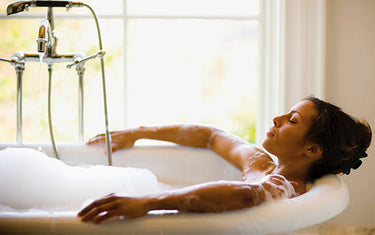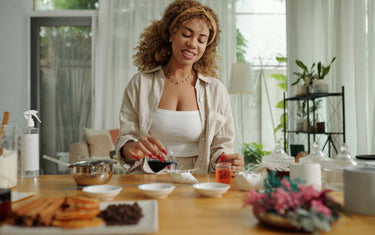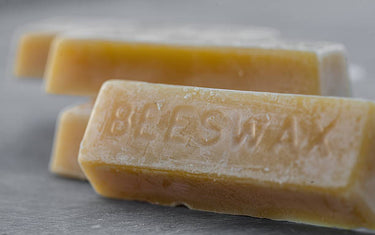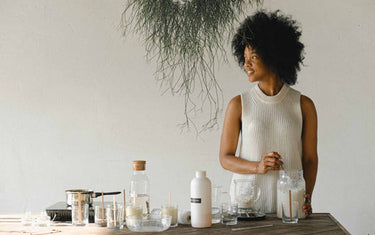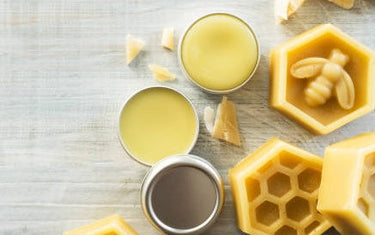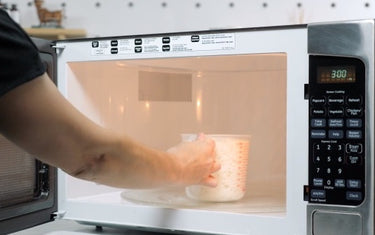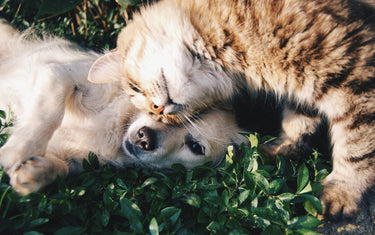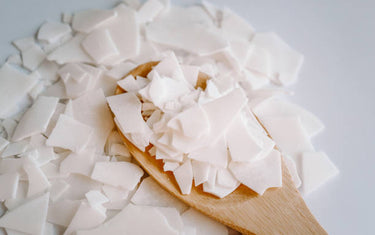6 min read / 18 November 2022 / Laura Garvin Gomez
How Much Fragrance Oil per Candle Should You Add?
Determining the optimum amount of fragrance oil to add to a candle can be tricky - learn the best methods here.
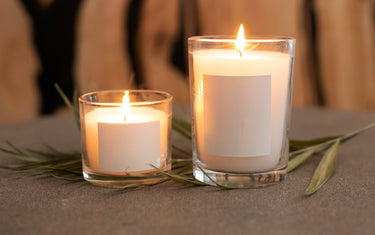
So, you want to make a candle.
You've selected all that you'll need - from the wax type to the wick length, container size to decorative touches - but there's one crucial element missing. The scent.
Deciding the best scents to use in a candle can prove difficult, especially if you don't know how much the scent is going to carry once it's added to your wax.
Opting for delicate classics like lavender essential oil is something many first-time candle makers go for, but with the right facts behind you, there's no limiting the kinds of fragrance creations you can make.
Learn about the differences between fragrance oils and essential oils and why that's important when making candles.
What fragrance oil to use for candle making
Choosing the right fragrance oil percentage is an important part of the candle making process, as it not only makes choosing the right scent easier, but also prevents unpleasant side effects once the candles actually lit - like sweating or curdling.
Getting the right scent throw for your liking is also key to the candle making process, and too much fragrance oil could quickly ruin what should have been a light and delicately-scented candle.
If you want to learn more about how to make a candle from scratch, you can follow our step-by-step beginner's guide to candle making.
Before we roll up our sleeves and get into the details, don’t forget you can join our wholesale program for amazing prices on wholesale fragrance oils. It’s totally free to join and there’s no minimum order requirement.

How much fragrance oil per candle should I use?
Most waxes can hold up to 12% fragrance oil without affecting the burn of the candle, however it is generally recommended to stay at or under 10% to be safe. This equates to around 1.6 fluid ounces per pound of wax.
So, if you're looking at how much fragrance oil per 100g of soy wax to add, 10g of fragrance oil is ideal for a strong aroma.
If you're after a more subtle scent throw, a percentage of 5-6% may be better suited.
There are three key factors to identifying the perfect fragrance oil in candle percentage:
- The wax type
- The flash point of the oil
- The strength of the scent
Since there are several different elements at play for many of these factors, it's important for wannabe candle makers to always properly research the type of wax and oils to use before proceeding.
What wax is best for candle making?There are three popular wax choices for candle making: soy wax, beeswax, and paraffin wax. Gel candles have also become a popular wax type, especially for those looking to include extra details their final product - like dried fruits or flowers. While all of these options have their advantages, using soy wax is generally recommended amongst hobbyists, as soy has a lower melting point than most other wax types. This means that it will burn slower in the container and allow your candle scent to be enjoyed for a longer period of time overall. It's also unlikely to produce smoke and black soot like paraffin wax often can. |
What is a flash point?
When heated, all liquids will reach a specific point where they start turning into a gas. While making candles, this reaction can be so subtle that we may not even notice it at all.
At certain temperatures, however, a liquid can start releasing so much vapour that, when presented with an open flame, it could easily be ignited. This is called a flash point.
Despite its scary-sounding nature, this really isn't as dangerous as it seems, since heat alone would never ignite the oil.
Regardless, knowing the flash point of your oil is important if you don't want to lose the scent of your candle. To find this information, simply refer to the Safety Data Sheet associated with your fragrance oil.
Learn more about flash points and why they're important.

How do I know which scents are strong?
Scent is subjective, so what may seem overly "strong smelling" to one person may not be the same for another.
That being said, certain fragrance oils are likely to carry a heavier scent profile than others. For instance, Aloe Vera & Coconut Water will smell objectively lighter than Candy Floss, but both can be equally toned up or toned down depending on the percentage you add to the wax.
Depending on the purpose of your candle, you might also want to adjust your scent throw accordingly. For instance, if you're looking to naturally repel spiders or rats with candles, adding a higher percentage of oil could help deter these pests in a more effective manner.
Why should I measure my ingredients in grams?
You may have noticed that the majority of candle instructions are laid out in grams - despite liquids generally being measured in millilitres.
This is done as a way to ensure weight accuracy. Since wax is solid at room temperature, it makes more sense to measure it - and the fragrance oils that go into it - in grams.
Thankfully, the conversion from millilitres to grams is generally the same - with slight variations depending on the density of the liquid. And since fragrance oils aren't particularly dense, it is pretty safe to assume their conversion will be similar.

Can I use carrier oils in my candles?
Some hobbyists swear by the use of carrier oils in their candles, particularly if you choose to opt for essential oils as your primary scent source.
As essential oils are very potent, adding too much to your candle may cause it to smoke more than desired once burned in an enclosed space.
Choosing the right carrier oil can prevent this while also helping to improve the scent throw overall.
As carrier oils are generally odourless, they won't affect the aromas in your candle.
Does this technique work with wax melts too?
Finding out how much fragrance oil for wax melts to use is just as simple as with candles.
The rules are essentially the same, and wax melts provide an easier alternative if you don't feel like jumping into candle making right away.
You can use our complete guide on how to make wax melts to give you a helping hand.

Experimenting with fragrance oil percentages can be great if you're still looking to find the right scent strength and technique for you.
To be safe, though, be sure to always keep your ratios on or below 10%, and ensure you're using fragrance oils with a low enough flash point to avoid crafting issues.
If you want to test how a scent travels before sticking it in your candle, you can try using an electric diffuser to get a rough idea.
Thinking of Selling Candles?
Ready to turn your candle-making hobby into a business venture? Explore our guide on getting started with selling candles for valuable tips and insights.
Whether you're looking to sell online, at local markets, or in retail stores, we've got you covered with everything you need to know to launch and grow your candle business successfully.
Before we finish up our discussion on the optimal amount of fragrance oil for candles, we'd like to remind you about our wholesale discounts.
By joining Nikura's wholesale program, you can access bulk business prices on wholesale fragrance oils, wholesale carrier oils, and wholesale candle wax making it easier to stock up on your candle-making essentials.
Plus, signing up is completely free, and there's no minimum order requirement. So, why wait? Join our wholesale program today and unlock great deals on wholesale fragrance oils to enhance your candle-making experience.



